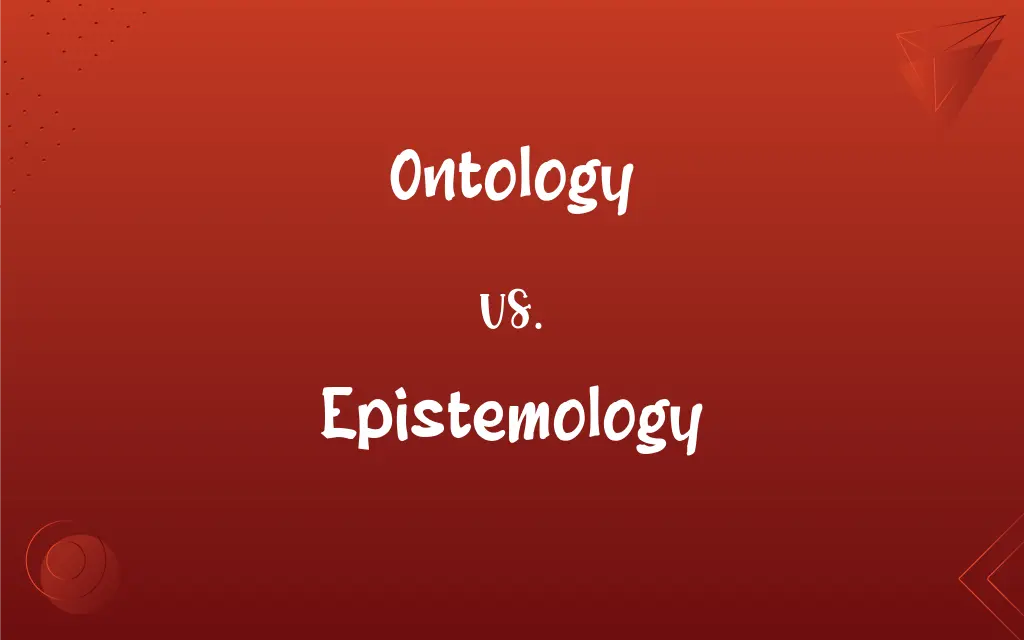Ontology vs. Epistemology: What's the Difference?
Edited by Aimie Carlson || By Harlon Moss || Updated on October 14, 2023
Ontology is the study of what exists. Epistemology is the study of knowledge and justified belief.

Key Differences
Ontology pertains to the philosophical study of being or existence, exploring various kinds and structures of entities that inhabit our world. Epistemology, in contrast, probes into the nature, origin, and scope of knowledge, inquiring how we come to know what we know. Each reflects on a distinct segment of philosophical inquiry, yet they intertwine when exploring broader conceptual schemas.
With ontology, inquiries delve into whether entities within certain categories exist and the nature of said existence. Epistemology, however, would ask how we can know whether such entities exist, emphasizing the methods and justifiability of such knowledge claims. Thus, ontological discussions might revolve around entities, while epistemological debates center on our conceptual grasp and certainty regarding them.
Ontology seeks to categorize and provide clarity on the types and hierarchies of existence, venturing into realms such as materialism or idealism. On the other side, epistemology discerns our means of obtaining knowledge about these entities and categories, dissecting the reliability and limitations of our cognitive processes and evidentiary systems.
Ontology, when discussed in computing or information science, relates to a set framework or an explicit specification of a conceptualization. Conversely, epistemology is pivotal in discussions around artificial intelligence, focusing on how machines might acquire, process, and utilize knowledge, reflecting divergent considerations within varied contexts.
Engagements with ontology frequently broach metaphysical debates, dissecting the nature of reality and examining the categories into which various entities are placed. Epistemology, however, navigates through the waters of belief, truth, and justification, fostering explorations into how we validate our knowledge about reality, thereby offering another lens through which to comprehend our world.
ADVERTISEMENT
Comparison Chart
Primary Focus
The nature of being and existence.
The nature and scope of knowledge.
Key Questions
What kinds of entities exist?
How do we know what we know?
Philosophical Branch
Metaphysics.
Theory of Knowledge.
Associated Disciplines
Metaphysics, Logic, Philosophy of Religion.
Cognitive Science, Philosophy of Science, Ethics.
Example Application
Classifying entities in a system or framework.
Evaluating the reliability of sensory perception.
ADVERTISEMENT
Ontology and Epistemology Definitions
Ontology
In metaphysics, ontology is a systematic account of Existence.
Ontology attempts to formulate a comprehensive view of the world and elucidate the meaning of being.
Epistemology
It also explores the justification of beliefs and claims to knowledge.
The class in epistemology discussed the various bases upon which knowledge claims could be justified.
Ontology
Ontology explores the nature and categorization of being.
Her study focused on ontology, examining the basic categories of existence and their relations.
Epistemology
It seeks to comprehend how knowledge is acquired and validated.
Epistemology critically evaluates the methodologies employed to ascertain and validate truths about the universe.
Ontology
Ontology deals with questions concerning what entities exist and can be said to exist.
Scientists and philosophers often diverge in their ontology, debating the existence and nature of entities like black holes or consciousness.
Epistemology
In philosophy, epistemology ponders on the relationship between belief, truth, and knowledge.
Her epistemological framework considered the nuanced relationship between belief and verifiable truth.
Ontology
In computer science, ontology refers to a precise conceptual schema.
The ontology of the software systematically categorized the data into relevant entities.
Epistemology
Epistemology examines the theory of knowledge, focusing on its nature, origin, and limits.
His research in epistemology delved into the robustness and limitations of sensory knowledge.
Ontology
Ontology can imply a set of concepts and categories that assist in structuring knowledge.
The ontology provided a structural guide for organizing the knowledge domain of biology.
Epistemology
Epistemology questions what it means to know something.
Epistemology prompts us to interrogate the depth and validity of our knowledge about the external world.
Ontology
The branch of metaphysics that deals with the nature of being.
Epistemology
The branch of philosophy that examines the nature of knowledge, its presuppositions and foundations, and its extent and validity.
Ontology
(Computers) A system for naming, classifying, and defining objects.
Epistemology
(uncountable) The branch of philosophy dealing with the study of knowledge; theory of knowledge, asking such questions as "What is knowledge?", "How is knowledge acquired?", "What do people know?", "How do we know what we know?", "How do we know it is true?", and so on.
Some thinkers take the view that, beginning with the work of Descartes, epistemology began to replace metaphysics as the most important area of philosophy.
Epistemology
(countable) A particular instance, version, or school thereof; a particular theory of knowledge.
In his epistemology, Plato maintains that our knowledge of universal concepts is a kind of recollection.
Epistemology
The theory or science of the method or grounds of knowledge.
Epistemology
The philosophical theory of knowledge
FAQs
How does ontology differ from epistemology?
Ontology deals with the nature of existence and entities, while epistemology explores the nature, scope, and limits of knowledge and belief.
What is ontology?
Ontology is the philosophical study of being, exploring existence and the nature of entities that inhabit our world.
Is ontology always related to philosophy?
While deeply rooted in philosophy, ontology also finds relevance in information science, where it helps in structuring and categorizing data.
Can ontology influence epistemology?
Yes, one’s ontological perspectives on what exists can influence their epistemological stance on how things are known and understood.
How does epistemology evaluate knowledge?
Epistemology evaluates knowledge by examining the justification, truth, belief, and reliability of information and how it's acquired.
Can ontology be applied to artificial intelligence?
Yes, in artificial intelligence, ontology helps in defining and categorizing knowledge within systems to aid in information management and retrieval.
Does ontology delve into non-material entities?
Yes, ontology explores both material and non-material entities, including abstract concepts like numbers and properties.
What are key questions in epistemology?
Key questions in epistemology involve understanding the origin, nature, and limits of knowledge, and what constitutes as justified belief.
How does ontology engage with the concept of reality?
Ontology engages with reality by exploring and categorizing the entities that exist within it and by probing the nature and structure of existence itself.
How does epistemology address the concept of belief?
Epistemology investigates belief by exploring what constitutes belief, how beliefs relate to truth, and how beliefs can be justified.
In what way does epistemology intersect with science?
Epistemology intersects with science by exploring how scientific knowledge is acquired, validated, and understood, and discussing the reliability of scientific methods.
What are some key debates in epistemology?
Key debates in epistemology may revolve around the sources of knowledge, the standards of belief justification, and the nature of truth.
Is skepticism an aspect of epistemology?
Yes, skepticism, which questions the certainty and reliability of knowledge, is a significant area within epistemological discussions.
What is an example of an ontological question?
An ontological question might be: "Do numbers exist independently of human thought?"
How does empirical evidence relate to epistemology?
Empirical evidence is vital in epistemology as it relates to knowledge derived from sensory experience and how it’s understood and validated.
Is ontology concerned with physical or metaphysical entities?
Ontology is concerned with both physical entities (like objects) and metaphysical ones (like concepts or properties).
Can an individual's ontology influence their worldview?
Absolutely, an individual’s ontology, or understanding of what exists, significantly shapes their worldview and beliefs about reality.
Is certainty a major concern in epistemology?
Yes, epistemology often deals with the concept of certainty, exploring when and how knowledge claims can be considered certain or indubitable.
Does epistemology involve ethical considerations?
Yes, epistemology can involve ethics when discussing the responsibility and integrity in belief formation, knowledge dissemination, and methodological applications.
Can ontology have practical applications in technology?
Yes, in technology, especially in information systems and AI, ontology helps define and categorize data, ensuring coherent and effective data management.
About Author
Written by
Harlon MossHarlon is a seasoned quality moderator and accomplished content writer for Difference Wiki. An alumnus of the prestigious University of California, he earned his degree in Computer Science. Leveraging his academic background, Harlon brings a meticulous and informed perspective to his work, ensuring content accuracy and excellence.
Edited by
Aimie CarlsonAimie Carlson, holding a master's degree in English literature, is a fervent English language enthusiast. She lends her writing talents to Difference Wiki, a prominent website that specializes in comparisons, offering readers insightful analyses that both captivate and inform.
































































